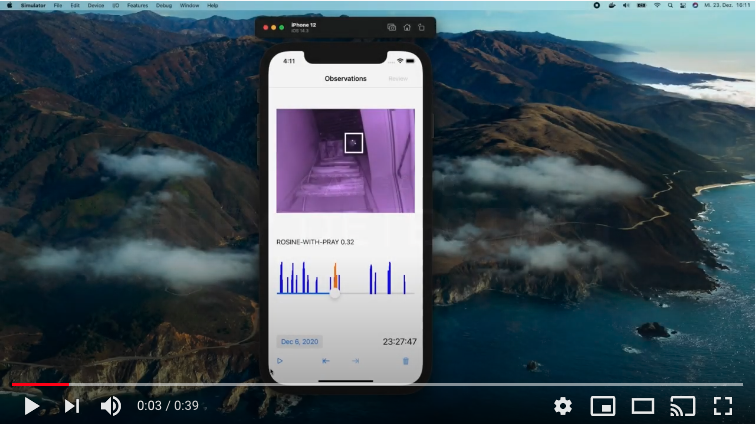Keep your cat’s prey out of your home with a machine learning trained pet door. Turn your Sureflap cat flap into a smart flap that locks when you cat tries to take prey into your home. Leverage Google Coral Edge TPU to run millisecond inference on infrared images captured on your Raspberry Pi. Object detection is based on TFLite and a MobileNet v1 SSD.
- Sureflap or Sureflap Connect
- Raspberry Pi 4B
- Raspberry USB Power supply
- Case for Raspberry
- MicroSD Card
- Google Coral
- Infrared camera
- Camera cable
- Jumper cables
- Motion detector
- Relay
Clone this repo on your raspberry and run:
echo "deb https://packages.cloud.google.com/apt coral-edgetpu-stable main" | sudo tee /etc/apt/sources.list.d/coral-edgetpu.list
curl https://packages.cloud.google.com/apt/doc/apt-key.gpg | sudo apt-key add -
sudo apt-get update
sudo apt-get install libedgetpu1-std
pip3 install awscli --upgrade --user
aws configure
cp config.yaml ~/.config/mousehunter-edge/config.yamlConnect motion detector OUT to GPIO8, check pinout to see your layout.
3V3 (1) (2) 5V <--- motion detector VCC
GPIO2 (3) (4) 5V <--- + port of relay
GPIO3 (5) (6) GND <--- motion detector GND
GPIO4 (7) (8) GPIO14
GND (9) (10) GPIO15
GPIO17 (11) (12) GPIO18
GPIO27 (13) (14) GND
GPIO22 (15) (16) GPIO23
3V3 (17) (18) GPIO24
GPIO10 (19) (20) GND
GPIO9 (21) (22) GPIO25
GPIO11 (23) (24) GPIO8 <--- motion detector OUT
GND (25) (26) GPIO7
GPIO0 (27) (28) GPIO1
GPIO5 (29) (30) GND
GPIO6 (31) (32) GPIO12
GPIO13 (33) (34) GND
GPIO19 (35) (36) GPIO16
s-port of relay ---> GPIO26 (37) (38) GPIO20
- port of relay ---> GND (39) (40) GPIO21
Configure ~/.config/mousehunter-edge/config.yaml with your AWS bucket name and ensure that aws credentials can read the objects in it.
Keep APNToken and certfile empty if you do not have it.
bucket: <your AWS S3 bucket>
curfewTime: 15
APNToken: <your Apple Push Notification Service (APNs) Token>
APNToken2: <your 2nd Apple Push Notification Service (APNs) Token>
alertThreshold: 2.0
certfile: <your Apple certificate for APN for APN usage> Update WorkingDirectory values for both .service files.
sudo systemctl enable mausjaeger.service
sudo systemctl enable imagewatcher.service
sudo systemctl start mausjaeger.service
sudo systemctl start imagewatcher.servicelabel you data with labelImg: https://github.com/tzutalin/labelImg
Convert your labeled data to the TFRecord file format, e.g. with https://roboflow.com
Follow the coral.ai tuturials part "Set up the Docker container" on a machine with strong CPU. No GPU is required. https://coral.ai/docs/edgetpu/retrain-detection/#set-up-the-docker-container
Copy your TFRecords to docker/object_detection/data
Configure train_input_reader, eval_input_reader and model.ssd.num_classes the training pipeline:
docker/object_detection/out/ckpt/pipeline.config
Remove all lines following "PREPARING dataset" and execute the script:
docker/object_detection/scripts/prepare_checkpoint_and_dataset.sh
Contine to follow the coral.ai tutorial part "Start training" and "Compile the model for the Edge TPU" Copy the created model to the imagewatcher/model/ folder.


